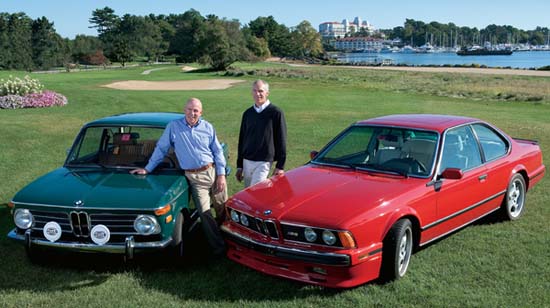 |
 |
| current issue |  | past issues |  | send a letter/news |  | address update |  | advertise |  | about us |  | alumni home |
Alumni Profiles
|
Jump Start Friends turn a college scheme into a lifelong business By Anne Downey '95G |
|
 Perry Smith/UNH Photographic Services |
Bavarian Autosport, owned and operated by Mark Ruddy '73, Peter Robart '73 and their friend Dave Wason is the leading BMW and Mini Cooper parts and accessories cataloger in the world. They mail over half a million free catalogs each year to their customers, a tribe of do-it-yourselfers who are passionate about their ultimate driving machines. They stock over 400,000 parts, shipping them from their 70,000-square-foot distribution center in Portsmouth, N.H. Their success, they say, has little to do with a business plan. Their story is about friendship, luck, and one thing that, at age 22, they knew for sure: that they didn't want to work for anyone else.
The story starts in 1971 when Ruddy blew out the engine of a friend's Porsche 912 while scanning the New Hampshire coastline for surf. Ruddy grew up in northern California, in a family of gearheads; his dad was a B-52 pilot, and Ruddy and his brother spent their formative years building hot rods in their garage. His dad was transferred to Pease Air Force Base when Ruddy was a senior in high school, and he fell in love with the area. When it came time to apply to college, he only applied to UNH. "Life was changing so rapidly back then," he remembers. "I started high school wearing rolled-up jeans and white socks, and finished wearing sandals, with a surfboard under my arm. When I started at UNH in 1969, we still had house mothers in the dorms. By 1971, a lot of us were getting arrested at May Day in Washington, D.C."
A friend helped him rebuild the 912, and as soon as he could afford to, he bought his own, second-hand, for $1,700. When his brother told him that he could get more than twice that amount for the car in California, he, Robart and Wason started a business driving Porsches cross-country and selling them at a profit. On their way back east, they stopped in Sun Valley to ski, and were introduced to the hot tub culture, getting into tubs made from wine barrels and crude water heaters after a long day on the slopes.
The early 1970s were a pivotal moment in American car culture, as consumers shifted their focus from American-made muscle cars to foreign sports cars. Ruddy fancied Porsches, Robart was driving Volvos, but at some point, they got into a BMW Bavaria and fell in love with the car and the manufacturer. "It had a sporty disposition, handled really well, and every year, they made it better," Ruddy says. "Back then, there were so few on the roads that drivers would blink their lights at each other."
They opened a BMW repair shop in Stratham, N.H., and a year later, bought the H.R. Haines Mobil Station in Newmarket, fixing cars and accumulating junked ones, which they dismantled for parts. "We were fixing cars, answering the phone with wrenches in our hands, and putting parts in boxes to ship to customers," Ruddy remembers. They also built a hot tub, which they set up on their loading dock, and had parties in it after a long day fixing cars; eventually, they sold a few of those, too.
"One of the town's councilmen, who later became a customer, told me that they had town council meetings where all they did was discuss what to do about the goings-on on our property," Ruddy says with a smile.
In the early 1980s, they bought their first new piece of equipment: an IBM Selectric typewriter, on which they typed up their first parts list. Ruddy says his wife, Donna Lorange Ruddy '74, was "way ahead of us in terms of understanding marketing. She was the one who built us into a brand." Eventually, 12,000 3-inch-by-5-inch cards morphed into a catalog, and the parts business got so big that they put down the wrenches.
"The New Hampshire economy runs on a frugal model, and that was our way of doing things, too," Robart says. "We never put it all on the line, never made a huge wager, just worked really hard and made a series of incremental steps. And at some point we realized, 'Maybe we can do this for a long time.' And here we are, 36 years later."
blog comments powered by Disqus
